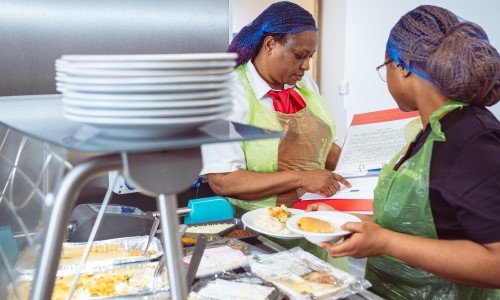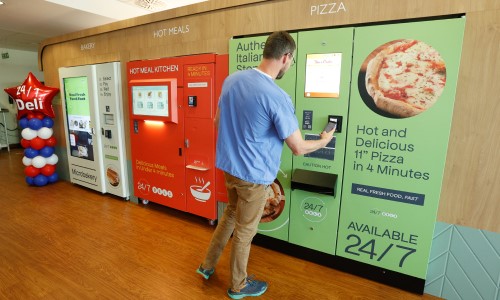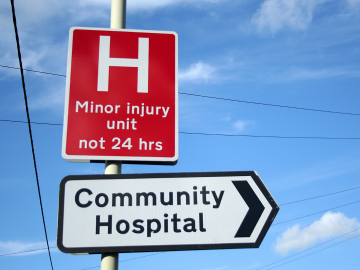Exploring the standards in more depth, with the opportunity to hear how other providers are tackling the challenges presented in achieving the standards, is a great way to collaborate and collectively enhance the quality of hospital food and drink.
Discover how NHS England are starting to assess progress against the National Standards for Healthcare Food & Drink and where challenges still occur. Hear examples of how providers are tackling implementation and solutions they’re putting in place – catch up on NHS England & Sodexo’s webinar here.
The results of the Premises Assurance Model (PAM) have been received, and NHS England are assessing, for the first time, how providers are progressing with implementing the mandatory National Standards for Healthcare Food & Drink. New questions added in 2023, alongside feedback obtained from visits, discussions, conferences and seminars, provide NHSE teams the opportunity to review how the National Standards are ‘bedding in’ a year on since their publication.
Exploring the standards in more depth, with the opportunity to hear how other providers are tackling the challenges presented in achieving the standards, is a great way to collaborate and collectively enhance the quality of hospital food and drink.
As a result, Sodexo Health & Care with NHS England, arranged two webinars to review the standards in practice. The first webinar, delivered in December 2023, reviewed four of the eight standards – Food Safety, 24/7 Food Provision, Leadership and Waste.
Learning together: Webinar Takeaways
 Food Safety
Food Safety
Food safety, arguably the most important Standard, Food Safety was the primary reason for the initial Hospital Food Review, after seven patients died in 2019 having contract listeriosis, linked to the supply of pre-packaged sandwiches in hospital.
Phil Shelley, Chair of the NHS Food Review, highlighted that to look after and care for vulnerable people, ‘every Trust needs to ensure it has in place responsible, competent and accountable people to set out food safety management systems and HACCP controls to put us in the best position going forward.’
Sian Langford, Facilities Compliance and Sustainability Manager, added some practical examples of how The Robert Jones & Agnes Orthopaedic NHS Foundation Trust (RJAH) adapted their approach after the standards were released.
‘We were very reassured, but we weren’t necessarily assured, and that’s where the standards are so welcome.’ For example, at RJAH, training was already being offered, however, the delivery was variable. Following a review, training was made directly relevant to the Trust, and staff were encouraged to ask questions in a safe space – so it’s no longer a tick-box exercise that they just need to get to the end of. RJAH has a training partner they’re really engaged with. Regular feedback and reviews enable the Trust to learn where staff are asking questions and where they’re not confident, so their approach and process can be adapted.
An open-door approach at the Trust has created a culture of improvement where ward teams feel confident to ask questions and challenge as food production & delivery and safety precautions have become more visible across the Trust.
24/7 food provision
 Standard 8, 24/7 Food Provision, is about meeting the nutritional needs of staff, so they can continue providing care and treatment on a daily, 24/7, basis. Not being able to leave the ward and have a hot meal is often cited in staff surveys, impacting directly on both retention and recruitment.
Standard 8, 24/7 Food Provision, is about meeting the nutritional needs of staff, so they can continue providing care and treatment on a daily, 24/7, basis. Not being able to leave the ward and have a hot meal is often cited in staff surveys, impacting directly on both retention and recruitment.
The standard states that a Trust must have a suitable 24/7 solution which is appropriate for the site and demographic. As Tim Radcliffe, Net Zero Food Programme Manager at NHSE states, ‘one-size does not fit all. There are lots of different solutions, including retail, auto-cafes, unattended retail, comfortable staff areas, hydration stations, or even smart cold/hot fridges within an area.’
Militsa Pribetich-Gill discussed Sodexo Health & Care's approach. Starting by understanding staff needs, a range of different solutions were assessed based on several criteria, including choice, quality, sustainability and cost. Sodexo introduced a fully self-serviced automated 24/7 Deli solution through seven advanced hot & cold meal production machines.
A trial in Royal Stoke University Hospital in April 2023 has been evaluated, with staff scoring for quality, variety and ease of use 4.9/5 and 5/5 for convenience.
For anyone looking to implement a third-party system on site, Tim recommends that contract reviews and break points are in place to ensure the solution works for the provider, the Trust and, most importantly, the staff - ‘no member of the NHS should be penalised for working outside what we deem core hours.’
Board-level Leadership
It’s recognised that having strong and fair leadership in place provides support that teams need to deliver effectively.
The Standards require that organisations have a designated board director responsible for food and that compliance is a standing agenda item at board level.
At RJAH, Sian highlights that having clinical board-level leadership is critical for their approach. Their Chief Nurse is their board-level lead despite both food, and cleaning, reporting into a different function. Sian states ‘at the highest level, food is considered medicine and that’s the stall we’re setting out and the standard we’re starting from.’
Communication is really important. Alongside formal governance processes and reporting, RJAH keeps senior teams engaged in a variety of non-formal ways, such as taste-testing new menus and meal options. ‘Keep it simple, a good conversation can be worth more than reams of paper’ is the advice from Sian.
One way Sian suggests senior support can be obtained, is by making food an unavoidable subject, so your board recognises that food is important and must be on their agenda. Engaging the patient panel and obtaining patient feedback is a good way to do that – and not being afraid to use benchmarking data to assess performance. Those tools are there to help enhance service quality, as well as raising the profile of food.
Food Waste
The ERIC returns for 2023/24 will ask for weighed food waste broken down into preparation waste, plate waste, unserved meals and spoilage. Tim addresses the importance of understanding where we’re starting from ‘by knowing what levels of food waste we have across healthcare, we can monitor it, measure it and ultimately reduce it’.
Best practice guidance on Food Waste, which is due to be published shortly, will provide guidance for Trusts and catering managers.
Sodexo Health & Care’s food waste monitoring programme started three years ago in retail and has expanded to also include patient dining. As Militsa explained - a simple digital solution, which was not too labour-intensive to implement while providing the data and analysis to drive meaningful actions, was chosen.
With a focus on two key areas, pre-consumption production and plate waste, the Sodexo solution helped identify the core, actionable insights to base plans on, resulting in a 40% reduction preventing over 82,000 kg of food waste from occurring over last three years.
Click here to watch the webinar back now and hear more about the National Standards implementation and NHS England’s focus for 2024.
The second webinar, on 15th May 2024, will cover the remaining standards: Food & Drink strategy, Dietetic Advice & Support, High Calibre Workforce and Learning & Development.
Recommended for you:
- How will technology skills shape EFM in an integrated NHS landscape
- The future of NHS Estates and Facilities - Interview with Simon Corben
- The new National Healthcare Food & Drink Standards - Interview with Phil Shelley

.png?t=thumbnail360)

